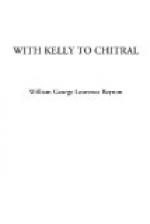The Pioneer native officers told us that each sack was worth at least one hundred rupees in Peshawur, but we would gladly have exchanged the whole amount for half the amount of flour. One of the sacks was emptied out and the men allowed to help themselves; each man took away a handful or so, as natives are very fond of it for cooking purposes, especially for curry, a little going a long way. The whole camp smelt of caraway seed, and not an unpleasant smell either. The house was pulled down for firewood. Everyone was delighted with the camp, and it was as picturesque as could be desired. The weather was first-class for bivouacking, the trees were in full leaf, and gave a delightful shade, while the ground was covered with a good sound turf.
Foraging parties were sent out immediately, and the villagers who had met us promised to go and induce their friends to return. In fact, they did collect some ten men, each of whom brought a small sack of flour, and with that and what the foraging parties brought in, we had enough for ourselves and the coolies for three days, by which time we hoped to arrive in Chitral. A good deal of the grain brought in consisted of unhusked rice and millet, what canary birds are fed on in England,—good enough for the coolies, at any rate, most of them having been used to it from childhood. We tried to get the village water-mills going, but all the ironwork had been carried away, and we had no means of quickly refitting them, so the unthreshed rice and millet seed was issued as it was, and the men had to grind it as best they could, with stones. We still had some goats and sheep, and the men used to get a meat ration whenever there was enough to go round.
The rearguard was in by 5 P.M. that day, the first time since we had left Mastuj that it had come in before dark. Things were looking up.
The bridge at Mori had been burned, but we heard of another some two miles farther down, which, if destroyed, could be more easily mended, and as the reputed position taken up by the enemy could be turned from the right bank of the river, it was determined to repair it.
Consequently, early the next morning, Oldham and his Sappers, with a covering party of one company of Pioneers under Bethune, and the Hunza Levies, started to repair the bridge, and be ready to cross and turn the enemy’s flank, should he be found awaiting us.
An hour later the main body started over a road leading along a high cliff. Here and there the enemy had evidently made attempts to destroy the road, but so ineffectually that the advance guard hardly delayed its advance for five minutes to repair it, and by 10 A.M. we had reached the broken bridge, and found Oldham and his party hard at work mending it.
The great difficulty was want of beams to stretch across from pier to pier, but attempts were being made to get these from an adjacent village on the opposite bank of the river.




